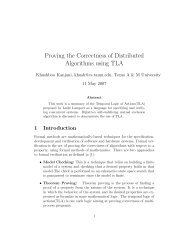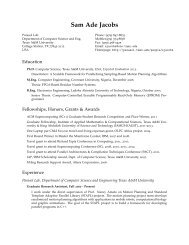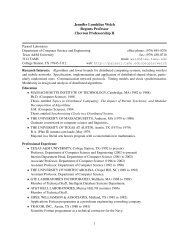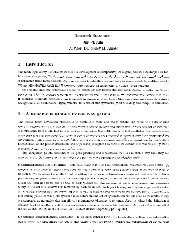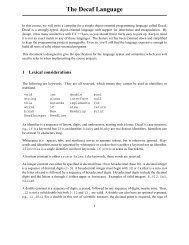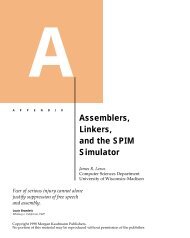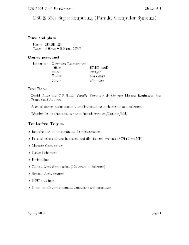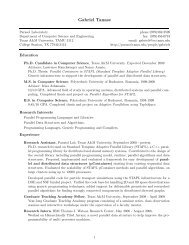Hoard: A Scalable Memory Allocator for Multithreaded Applications
Hoard: A Scalable Memory Allocator for Multithreaded Applications
Hoard: A Scalable Memory Allocator for Multithreaded Applications
Create successful ePaper yourself
Turn your PDF publications into a flip-book with our unique Google optimized e-Paper software.
single-threaded benchmarks [12, 19]<br />
espresso<br />
optimizer <strong>for</strong> programmable logic arrays<br />
Ghostscript PostScript interpreter<br />
LRUsim<br />
locality analyzer<br />
p2c<br />
Pascal-to-C translator<br />
multithreaded benchmarks<br />
threadtest each thread repeatedly allocates<br />
and then deallocates 100,000/P objects<br />
shbench [26] each thread allocates and randomly frees<br />
random-sized objects<br />
Larson [22] simulates a server: each thread allocates<br />
and deallocates objects, and then transfers<br />
some objects to other threads to be freed<br />
active-false tests active false sharing avoidance<br />
passive-false tests passive false sharing avoidance<br />
BEMengine [7] object-oriented PDE solver<br />
Barnes-Hut [1, 2] n-body particle solver<br />
Table 1: Single- and multithreaded benchmarks used in this<br />
paper.<br />
widely varying memory usage patterns. We used the same inputs<br />
<strong>for</strong> these programs as Wilson and Johnstone [19].<br />
There is as yet no standard suite of benchmarks <strong>for</strong> evaluating<br />
multithreaded allocators. We know of no benchmarks that specifically<br />
stress multithreaded per<strong>for</strong>mance of server applications like<br />
web servers 1 and database managers. We chose benchmarks described<br />
in other papers and otherwise published (the Larson benchmark<br />
from Larson and Krishnan [22] and the shbench benchmark<br />
from MicroQuill, Inc. [26]), two multithreaded applications which<br />
include benchmarks (BEMengine [7] and barnes-hut [1, 2]), and<br />
wrote some microbenchmarks of our own to stress different aspects<br />
of memory allocation per<strong>for</strong>mance (threadtest, active-false,<br />
passive-false). Table 1 describes all of the benchmarks used in this<br />
paper. Table 4 includes their allocation behavior: fragmentation,<br />
maximum memory in use (U) and allocated (A), total memory requested,<br />
number of objects requested, and average object size.<br />
5.1 Speed<br />
Table 2 lists the uniprocessor runtimes <strong>for</strong> our applications when<br />
linked with <strong>Hoard</strong> and the Solaris allocator (each is the average<br />
of three runs; the variation between runs was negligible). On average,<br />
<strong>Hoard</strong> causes a slight increase in the runtime of these applications<br />
(6.2%), but this loss is primarily due to its per<strong>for</strong>mance<br />
on shbench. <strong>Hoard</strong> per<strong>for</strong>ms poorly on shbench because shbench<br />
uses a wide range of size classes but allocates very little memory<br />
(see Section 5.4 <strong>for</strong> more details). The longest-running application,<br />
LRUsim, runs almost 3% faster with <strong>Hoard</strong>. <strong>Hoard</strong> also per<strong>for</strong>ms<br />
well on BEMengine (10.3% faster than with the Solaris allocator),<br />
which allocates more memory than any of our other benchmarks<br />
(nearly 600MB).<br />
5.2 Scalability<br />
In this section, we present our experiments to measure scalability.<br />
We measure speedup with respect to the Solaris allocator. These<br />
applications vigorously exercise the allocators as revealed by the<br />
1 <strong>Memory</strong> allocation becomes a bottleneck when most pages served<br />
are dynamically generated (Jim Davidson, personal communication).<br />
Un<strong>for</strong>tunately, the SPECweb99 benchmark [31] per<strong>for</strong>ms<br />
very few requests <strong>for</strong> completely dynamically-generated pages<br />
(0.5%), and most web servers exercise dynamic memory allocation<br />
only when generating dynamic content.<br />
program runtime (sec) change<br />
Solaris <strong>Hoard</strong><br />
single-threaded benchmarks<br />
espresso 6.806 7.887 +15.9%<br />
Ghostscript 3.610 3.993 +10.6%<br />
LRUsim 1615.413 1570.488 -2.9%<br />
p2c 1.504 1.586 +5.5%<br />
multithreaded benchmarks<br />
threadtest 16.549 15.599 -6.1%<br />
shbench 12.730 18.995 +49.2%<br />
active-false 18.844 18.959 +0.6%<br />
passive-false 18.898 18.955 +0.3%<br />
BEMengine 678.30 614.94 -10.3%<br />
Barnes-Hut 192.51 190.66 -1.0%<br />
average +6.2%<br />
Table 2: Uniprocessor runtimes <strong>for</strong> single- and multithreaded<br />
benchmarks.<br />
large difference between the maximum in use and the total memory<br />
requested (see Table 4).<br />
Figure 3 shows that <strong>Hoard</strong> matches or outper<strong>for</strong>ms all of the<br />
allocators we tested. The Solaris allocator per<strong>for</strong>ms poorly overall<br />
because serial single heap allocators do not scale. MTmalloc<br />
often suffers from a centralized bottleneck. Ptmalloc scales well<br />
only when memory operations are fairly infrequent (the Barnes-<br />
Hut benchmark in Figure 3(d)); otherwise, its scaling peaks at around<br />
6 processors. We now discuss each benchmark in turn.<br />
In threadtest, t threads do nothing but repeatedly allocate and<br />
deallocate 100, 000/t 8-byte objects (the threads do not synchronize<br />
or share objects). As seen in Figure 3(a), <strong>Hoard</strong> exhibits linear<br />
speedup, while the Solaris and MTmalloc allocators exhibit severe<br />
slowdown. For 14 processors, the <strong>Hoard</strong> version runs 278% faster<br />
than the Ptmalloc version. Unlike Ptmalloc, which uses a linkedlist<br />
of heaps, <strong>Hoard</strong> does not suffer from a scalability bottleneck<br />
caused by a centralized data structure.<br />
The shbench benchmark is available on MicroQuill’s website<br />
and is shipped with the SmartHeap SMP product [26]. This benchmark<br />
is essentially a “stress test” rather than a realistic simulation<br />
of application behavior. Each thread repeatedly allocates and frees<br />
a number of randomly-sized blocks in random order, <strong>for</strong> a total of<br />
50 million allocated blocks. The graphs in Figure 3(b) show that<br />
<strong>Hoard</strong> scales quite well, approaching linear speedup as the number<br />
of threads increases. The slope of the speedup line is less than ideal<br />
because the large number of different size classes hurts <strong>Hoard</strong>’s<br />
raw per<strong>for</strong>mance. For 14 processors, the <strong>Hoard</strong> version runs 85%<br />
faster than the next best allocator (Ptmalloc). <strong>Memory</strong> usage in<br />
shbench remains within the empty fraction during the entire run so<br />
that <strong>Hoard</strong> incurs very low synchronization costs, while Ptmalloc<br />
again runs into its scalability bottleneck.<br />
The intent of the Larson benchmark, due to Larson and Krishnan<br />
[22], is to simulate a workload <strong>for</strong> a server. A number of threads<br />
are repeatedly spawned to allocate and free 10,000 blocks ranging<br />
from 10 to 100 bytes in a random order. Further, a number<br />
of blocks are left to be freed by a subsequent thread. Larson and<br />
Krishnan observe this behavior (which they call “bleeding”) in actual<br />
server applications, and their benchmark simulates this effect.<br />
The benchmark runs <strong>for</strong> 30 seconds and then reports the number<br />
of memory operations per second. Figure 3(c) shows that <strong>Hoard</strong><br />
scales linearly, attaining nearly ideal speedup. For 14 processors,<br />
the <strong>Hoard</strong> version runs 18 times faster than the next best allocator,<br />
the Ptmalloc version. After an initial start-up phase, Larson



